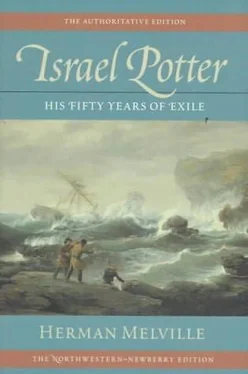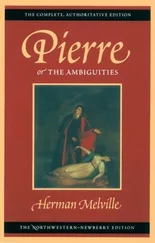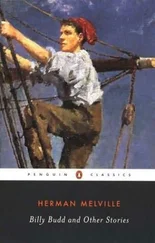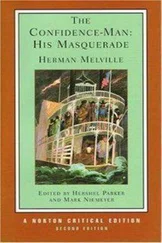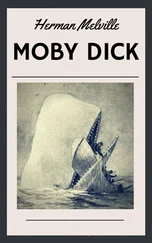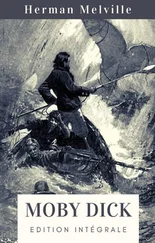Herman Melville - Israel Potter. Fifty Years of Exile
Здесь есть возможность читать онлайн «Herman Melville - Israel Potter. Fifty Years of Exile» весь текст электронной книги совершенно бесплатно (целиком полную версию без сокращений). В некоторых случаях можно слушать аудио, скачать через торрент в формате fb2 и присутствует краткое содержание. Жанр: Классическая проза, на английском языке. Описание произведения, (предисловие) а так же отзывы посетителей доступны на портале библиотеки ЛибКат.
- Название:Israel Potter. Fifty Years of Exile
- Автор:
- Жанр:
- Год:неизвестен
- ISBN:нет данных
- Рейтинг книги:4 / 5. Голосов: 1
-
Избранное:Добавить в избранное
- Отзывы:
-
Ваша оценка:
- 80
- 1
- 2
- 3
- 4
- 5
Israel Potter. Fifty Years of Exile: краткое содержание, описание и аннотация
Предлагаем к чтению аннотацию, описание, краткое содержание или предисловие (зависит от того, что написал сам автор книги «Israel Potter. Fifty Years of Exile»). Если вы не нашли необходимую информацию о книге — напишите в комментариях, мы постараемся отыскать её.
Israel Potter. Fifty Years of Exile — читать онлайн бесплатно полную книгу (весь текст) целиком
Ниже представлен текст книги, разбитый по страницам. Система сохранения места последней прочитанной страницы, позволяет с удобством читать онлайн бесплатно книгу «Israel Potter. Fifty Years of Exile», без необходимости каждый раз заново искать на чём Вы остановились. Поставьте закладку, и сможете в любой момент перейти на страницу, на которой закончили чтение.
Интервал:
Закладка:
"It is he, adorable Delilah; and fear not, even though incited by the foe, by clipping my locks, to dwindle my strength. Give me your sword, man," turning to an officer:-"Ah! I'm fettered. Clip it yourself, lady."
"No, no-I am-"
"Afraid, would you say? Afraid of the vowed friend and champion of all ladies all round the world? Nay, nay, come hither."
The lady advanced; and soon, overcoming her timidity, her white hand shone like whipped foam amid the matted waves of flaxen hair.
"Ah, this is like clipping tangled tags of gold-lace," cried she; "but see, it is half straw."
"But the wearer is no man-of-straw, lady; were I free, and you had ten thousand foes-horse, foot, and dragoons-how like a friend I could fight for you! Come, you have robbed me of my hair; let me rob your dainty hand of its price. What, afraid again?"
"No, not that; but-"
"I see, lady; I may do it, by your leave, but not by your word; the wonted way of ladies. There, it is done. Sweeter that kiss, than the bitter heart of a cherry."
When at length this lady left, no small talk was had by her with her companions about someway relieving the hard lot of so knightly an unfortunate. Whereupon a worthy, judicious gentleman, of middle-age, in attendance, suggested a bottle of good wine every day, and clean linen once every week. And these the gentle Englishwoman-too polite and too good to be fastidious-did indeed actually send to Ethan Allen, so long as he tarried a captive in her land.
The withdrawal of this company was followed by a different scene.
A perspiring man in top-boots, a riding-whip in his hand, and having the air of a prosperous farmer, brushed in, like a stray bullock, among the rest, for a peep at the giant; having just entered through the arch, as the ladies passed out.
"Hearing that the man who took Ticonderoga was here in Pendennis Castle, I've ridden twenty-five miles to see him; and to-morrow my brother will ride forty for the same purpose. So let me have first look. Sir," he continued, addressing the captive, "will you let me ask you a few plain questions, and be free with you?"
"Be free with me? With all my heart. I love freedom of all things. I'm ready to die for freedom; I expect to. So be free as you please. What is it?"
"Then, sir, permit me to ask what is your occupation in life-in time of peace, I mean?"
"You talk like a tax-gatherer," rejoined Allen, squinting diabolically at him; "what is my occupation in life? Why, in my younger days I studied divinity, but at present I am a conjurer by profession."
Hereupon everybody laughed, equally at the manner as the words, and the nettled farmer retorted:
"Conjurer, eh? well, you conjured wrong that time you were taken."
"Not so wrong, though, as you British did, that time I took Ticonderoga, my friend."
At this juncture the servant came with the punch, when his master bade him present it to the captive.
"No! — give it me, sir, with your own hands, and pledge me as gentleman to gentleman."
"I cannot pledge a state-prisoner, Colonel Allen; but I will hand you the punch with my own hands, since you insist upon it."
"Spoken and done like a true gentleman, sir; I am bound to you."
Then receiving the bowl into his gyved hands, the iron ringing against the china, he put it to his lips, and saying, "I hereby give the British nation credit for half a minute's good usage," at one draught emptied it to the bottom.
"The rebel gulps it down like a swilling hog at a trough," here scoffed a lusty private of the guard, off duty.
"Shame to you!" cried the giver of the bowl.
"Nay, sir; his red coat is a standing blush to him, as it is to the whole scarlet-blushing British army." Then turning derisively upon the private: "You object to my way of taking things, do ye? I fear I shall never please ye. You objected to the way, too, in which I took Ticonderoga, and the way in which I meant to take Montreal. Selah! But pray, now that I look at you, are not you the hero I caught dodging round, in his shirt, in the cattle-pen, inside the fort? It was the break of day, you remember."
"Come, Yankee," here swore the incensed private; "cease this, or I'll darn your old fawn-skins for ye with the flat of this sword;" for a specimen, laying it lashwise, but not heavily, across the captive's back.
Turning like a tiger, the giant, catching the steel between his teeth, wrenched it from the private's grasp, and striking it with his manacles, sent it spinning like a juggler's dagger into the air, saying, "Lay your dirty coward's iron on a tied gentleman again, and these," lifting his handcuffed fists, "shall be the beetle of mortality to you!"
The now furious soldier would have struck him with all his force, but several men of the town interposed, reminding him that it were outrageous to attack a chained captive.
"Ah," said Allen, "I am accustomed to that, and therefore I am beforehand with them; and the extremity of what I say against Britain, is not meant for you, kind friends, but for my insulters, present and to come." Then recognizing among the interposers the giver of the bowl, he turned with a courteous bow, saying, "Thank you again and again, my good sir; you may not be the worse for this; ours is an unstable world; so that one gentleman never knows when it may be his turn to be helped of another."
But the soldier still making a riot, and the commotion growing general, a superior officer stepped up, who terminated the scene by remanding the prisoner to his cell, dismissing the townspeople, with all strangers, Israel among the rest, and closing the castle gates after them.
CHAPTER XXII
SOMETHING FURTHER OF ETHAN ALLEN; WITH ISRAEL'S FLIGHT TOWARDS THE
WILDERNESS
Among the episodes of the Revolutionary War, none is stranger than that of Ethan Allen in England; the event and the man being equally uncommon.
Allen seems to have been a curious combination of a Hercules, a Joe Miller, a Bayard, and a Tom Hyer; had a person like the Belgian giants; mountain music in him like a Swiss; a heart plump as Coeur de Lion's.
Though born in New England, he exhibited no trace of her character. He was frank, bluff, companionable as a Pagan, convivial, a Roman, hearty as a harvest. His spirit was essentially Western; and herein is his peculiar Americanism; for the Western spirit is, or will yet be (for no other is, or can be), the true American one.
For the most part, Allen's manner while in England was scornful and ferocious in the last degree; however, qualified by that wild, heroic sort of levity, which in the hour of oppression or peril seems inseparable from a nature like his; the mode whereby such a temper best evinces its barbaric disdain of adversity, and how cheaply and waggishly it holds the malice, even though triumphant, of its foes!
Aside from that inevitable egotism relatively pertaining to pine trees, spires, and giants, there were, perhaps, two special incidental reasons for the Titanic Vermonter's singular demeanor abroad. Taken captive while heading a forlorn hope before Montreal, he was treated with inexcusable cruelty and indignity; something as if he had fallen into the hands of the Dyaks. Immediately upon his capture he would have been deliberately suffered to have been butchered by the Indian allies in cold blood on the spot, had he not, with desperate intrepidity, availed himself of his enormous physical strength, by twitching a British officer to him, and using him for a living target, whirling him round and round against the murderous tomahawks of the savages. Shortly afterwards, led into the town, fenced about by bayonets of the guard, the commander of the enemy, one Colonel McCloud, flourished his cane over the captive's head, with brutal insults promising him a rebel's halter at Tyburn. During his passage to England in the same ship wherein went passenger Colonel Guy Johnson, the implacable tory, he was kept heavily ironed in the hold, and in all ways treated as a common mutineer; or, it may be, rather as a lion of Asia; which, though caged, was still too dreadful to behold without fear and trembling, and consequent cruelty. And no wonder, at least for the fear; for on one occasion, when chained hand and foot, he was insulted on shipboard by an officer; with his teeth he twisted off the nail that went through the mortise of his handcuffs, and so, having his arms at liberty, challenged his insulter to combat. Often, as at Pendennis Castle, when no other avengement was at hand, he would hurl on his foes such howling tempests of anathema as fairly to shock them into retreat. Prompted by somewhat similar motives, both on shipboard and in England, he would often make the most vociferous allusions to Ticonderoga, and the part he played in its capture, well knowing, that of all American names, Ticonderoga was, at that period, by far the most famous and galling to Englishmen.
Читать дальшеИнтервал:
Закладка:
Похожие книги на «Israel Potter. Fifty Years of Exile»
Представляем Вашему вниманию похожие книги на «Israel Potter. Fifty Years of Exile» списком для выбора. Мы отобрали схожую по названию и смыслу литературу в надежде предоставить читателям больше вариантов отыскать новые, интересные, ещё непрочитанные произведения.
Обсуждение, отзывы о книге «Israel Potter. Fifty Years of Exile» и просто собственные мнения читателей. Оставьте ваши комментарии, напишите, что Вы думаете о произведении, его смысле или главных героях. Укажите что конкретно понравилось, а что нет, и почему Вы так считаете.
